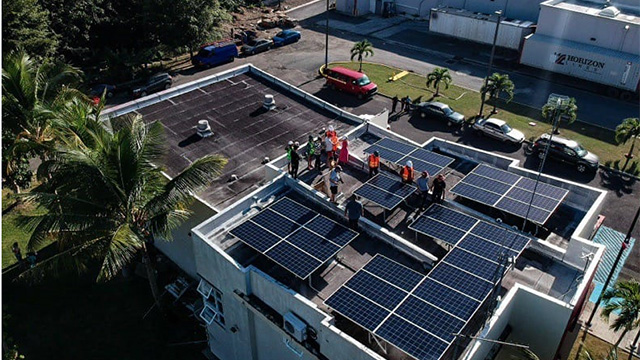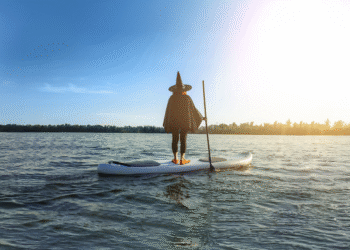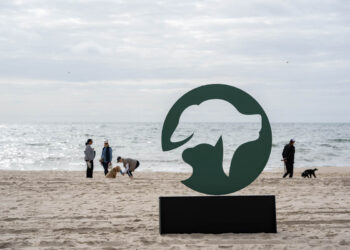When Hurricane Maria tore through Puerto Rico in 2017, 100 percent of Puerto Rico’s 3.4 million residents, hospitals, telecommunications, fire stations, as well as 85 percent of the police stations, were left without power.
Much of the island is still struggling from the devastating storm, but Solar Responders has set out to assist first responders save lives by providing a resilient, reliable, and renewable source of backup power. On Sunday, August 11, the organization will host Ruschmeyer’s x Solar Responders | An Evening to Benefit Puerto Rico featuring dinner, cocktails, salsa, and an auction hosted by Seth Herzog.
We caught up with Solar Responders co-founder Hunter Johansson to learn more about the organization and its Montauk benefit.
Could you speak about Solar Responders’ mission?
HJ: We install solar and battery storage on fire stations. We currently operate in Puerto Rico. We started in Puerto Rico after the hurricane in 2017, when first responders’ stations lost power across the island – 94 fire stations and 78 police stations. Our mission is to ensure that no person loses their life because first responders lack access to power. That’s our purpose – it’s empowering first responders with renewable energy so that they can do their jobs.
How soon after Hurricane Maria did you travel to Puerto Rico?
HJ: I was in Puerto Rico in January 2018, so about three and a half months after the storm.
How often do you go there now?
HJ: I’ve been going nearly every month since that trip, about every six weeks. So I’ve been to the islands 11 times since the storm.
From what you’ve seen, how are the recovery efforts going?
HJ: They’ve been very slow. I was actually talking to a friend that lives on the west side of the island, in Rincón, and she was telling me that she had just lost power. That’s maybe separate from the recovery, but the grid itself is weak and it’s been weak for a long time, since the hurricane exacerbated that. The recovery, it’s been slow and the people that are marginalized, they’re still in recovery. San Juan, the metro area, that’s where the tourism is, the economy, business. That’s where the recovery took place first. Meanwhile, there’s almost another 2 million people outside of that metro area that didn’t see that same level of urgency in the recovery.
Those people outside of metro, that’s the population that’s suffering and our government has failed Puerto Rico. They need to be held responsible and accountable and I think that was a part of the protests that we’ve seen. People are living it every day. There needs to be a better job of reporting on what’s going on in Puerto Rico. We forget it, with all that’s going on, we forget that this island, and our fellow US citizens are still in, almost two years out of the storm, still in recovery and we’re in the height of hurricane season.
 |
|
Solar Responders had their first successful installation in January 2019 in Rincon, Puerto Rico. (Photo: Solar Responders) |
Solar Responders had their first successful installation in January 2019 in Rincon, Puerto Rico. How has that impacted the area?
HJ: We did our first installation in Rincón. We were able to do it with a donation from writer, Colin Jost, who has been going to Puerto Rico for a while now. He comes from a family of firefighters.
After we received funding, three weeks later, we had the station up and running. The station serves a population of about 15,000 people. That’s the permanent residents, and there’s thousands of tourists that come, and then businesses. The power goes out fairly often in Rincón. The last time I checked, we had 12 instances of power outages of anywhere from a few minutes to six hours. While the community members still lack access when there’s a blackout, first responders still have power on so they can do their jobs, they can respond to emergencies. If the phones are working, they can receive 911 phone calls, they can go out of the station and radio and communicate with each other, which is critical, the communication aspect of being able to communicate between first responders and the public.
The idea is that in partnership with the community and first responders, they know that this is a safe and resilient place that they can go to when the power goes out.
Now that you’ve had your first installation, what is Solar Responders focused on at the moment?
HJ: So, we completed our second installation in Culebra, it’s an island off of Puerto Rico. We were very happy to do that partnership with local nonprofits specifically on the island of Culebra. It’s a really special place. They’re a very vulnerable place. They’re connected, in terms of their electricity, to the main island. And that connection is under water, a submarine power cable, and that cable was damaged in the storm. That island was without power, it was running on diesel generators, for about a year, maybe even a year and a half. Their power goes out constantly, and so they’re a very vulnerable population. We were very happy to do that station in May. The goal is to do the remaining fire stations – there’s 81 remaining fire stations that need solar and battery storage.
Our hope is that the government elects a governor that is focused on recovery, resiliency, and the long-term sustainability of the island. As the CEO of Solar Responders, I think resiliency should be a main focus of the new government, of politicians. It’s a win-win in every sense – in that it provides resiliency and sustainability, it provides local jobs and the fact that we hire locally, so the team who installs these systems is all local and Puerto Rican. It fits within the island’s green energy goals by 2050 to be 100 percent renewable energy. It’s not expensive what we do. For as much as we spend on recovery, and the billions that we spend on these massive consulting contracts, we need to be thinking about planning and planning now, planning for the future.
As far as long-term goals for the organization, do you hope to expand past Puerto Rico?
HJ: We would love to. There’s a lot of conferences in Puerto Rico, the Clinton Foundation has put on a couple, Environmental Defense Fund, I’ve met with folks at Sierra Club. There’s a lot of exciting conversations happening, and I’ve been having them for over a year now. I think, we’re kind of, at this stage, the goal is to scale to 81, focusing on on Puerto Rico. We’re able to do this in other places, the Virgin Islands and other islands. Those are goals that we’re planning on, but Puerto Rico is our focus right now.
In terms of a bigger picture, solar and storage – storage is the technology itself, it’s changing and getting better all the time. Literally, about every six months something new is coming out. Personally, for me, renewable energy should be the majority of energy production in the United States and around the world. Residential has been the focus of the industry. This is a new application of it. Not just the application, but also the training and the partnership that goes along with it. Firefighters, they’re a tough crowd, and their trust is earned. One of the founding members of Solar Responders is a fire department captain in Nevada. So, we’re proud that we are there for the fire department, for first responders.
What will the benefit at Ruschmeyer’s entail?
HJ: We’re super excited to team up with Ruschmeyer’s, one of the premier establishments in Montauk. It’s so cool to have that relationship of Puerto Rico and Montauk, being surfing communities, island communities. Both have been impacted by hurricanes. Both can benefit greatly from renewable energy.
I’ve known the folks over there for a few years now and for them to support a community that there’s such a close story/relationship with, it’s just so cool. It’s going to be a really fun day. We’re trying to make it as much as possible about the culture of Puerto Rico and just celebrate that. And to remind people that the island is still in recovery. It’s going to be the message of the event, and that as just people we can do a whole lot. While government is kind of failing the island, we are here to show what we can do.
Is there anything else you would like to add?
HJ: We can’t keep looking to government for solutions when disaster happens. The community, people and networks can do so much. Of course, we need government, we have a working partnership, but just the organization itself can do so much with our networks and our love and passion for helping each other. There’s a real close relationship. People on the island go to Puerto Rico – that friendship is real, and it exists and we should celebrate that. That’s what we’re going to do this weekend and celebrate that by meeting people where they’re at and supporting people so that they’re able to live a normal life as a person, as a US citizen.
Down there, the situation is life and death in a lot of places when a storm happens. Unless there’s reliable power, people will lose their life, and we saw that. If people don’t have access to medication or to critical services, emergency services that they need, and if they don’t have clean water, which happened, people will die. That’s my concern is that people in the vulnerable areas in the Caribbean, Texas, New Orleans, there’s going to be a lot of people that are going to lose their life because of it. And it’s a preventable problem.
Tickets to Ruschmeyer’s x Solar Responders | An Evening to Benefit Puerto Rico start at $150.
Ruschmeyer’s is located at 161 2nd House Road in Montauk. For tickets, visit givelively.org.












